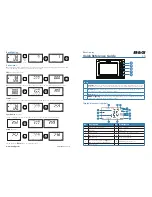
Operation and communication
2
0
2
0
-1
1
29
Exchange of Process Data
Within the CANopen network, process data is exchanged via process data objects (PDO). See
chapter 5.1.1. Process data objects are divided into:
•
Transmit PDOs (TxPDO)
Process data objects that transmit input data and diagnostic data.
•
Receive PDOs (RxPDO)
Process data objects that transmit output data.
The first 4 PDOs per transmit or receive data packet transmit the default CAN identifier. All
other PDOs of a data packet can be configured by the user.
Communication Types
In the CANopen network, various communication types are specified for process data objects.
The communication type of each PDO is controlled via the "Transmission Type" parameter. The
"Transmission Type" parameter is defined in subindex 2 of the communication parameter
object (from 0x1400) and is transmitted during the startup process via an SDO. See chapter
5.1.1.
The read head supports the following communication types:
"Transmission Type"
parameter
Transmission
Description
0
Event-driven
Synchronous
TxPDO
: Data is detected upon receipt of a
SYNC (=
Sync
hronization object). Data is
transmitted only in the event of a change.
RxPDO
: Data is sent in an event-controlled
manner and adopted in a SYNC.
1
Cyclic
Synchronous
Data is adopted and transmitted cyclically at
each nth SYNC.
n = 1 ... 240th
n can be individually assigned for each PDO
to control transmission cycles.
241 ... 251
Reserved
252 (TxPDO only)
Synchronous
RTR (=
R
emote
T
ransmission
R
equest)
Data is detected upon receipt of a SYNC.
Data is sent via RTR only on request.
253 (TxPDO only)
Asynchronous
RTR
Data is detected and sent via RTR only on
request.
254
Event-driven
Manufacturer-specific
Read head sends data when "Operational"
state is set and in the event of changes.
255
Event-driven
Profile-specific
Read head sends data when "Operational"
state is set and in the event of changes.
Table 5.2
"Transmission Type" parameter
















































